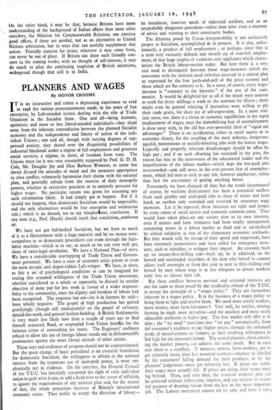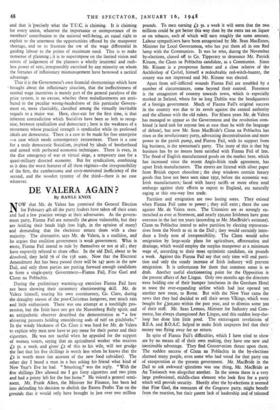PLANNERS AND WAGES
By HONOR CROOME
IT is an instructive and rather a depressing experience to read in 1948 the various pronouncements made, in the years of free enterprise, by Left-minded writers dealing with the role of Trade Unionism in the Socialist State. One and all—being humane, optimistic and more or less liberal-minded individuals—they shied away from the inherent contradiction between the planned Socialist economy and the independence and liberty of action of the indi- vidual Unions ; one and all, though with varying degrees of sup- pressed anxiety, they skated over the disquieting possibilities of industrial blackmail under a regime of full employment and generous social services, a regime, in short, of freedom from want. The Unions must (so it was very reasonably supposed by Prof. G. D. H. Cole, Mr. Douglas Jay and Miss Barbara Wootton, to name but three) discard the attitudes of mind and the measures appropriate to class conflict, voluntarily harmonise their claims with the national plan, ana generally refrain from the exercise of their monopoly powers, whether in restrictive practices or in untimely pressure for higher wages. No particular reason was given for assuming any such reformation likely. It had simply got to happen. For if it should not happen, then democratic Socialism would be impossible, and the only alternatives would be free enterprise and totalitarian rule ; which is an absurd, not to say blaspherhous, conclusion. If any man (e.g., Prof. Hayek) should reach that conclusion, anathema sit.
We have not got full-bodied Socialism, but we have as much of it as a Government with a huge majority and by no means over- scrupulous as to democratic procedures can cram through the legis- lative machine—which is to say, as much as we can very well get, short of extra-legal revolution. We have a National Plan—of sorts. We have a considerable overlapping of Trade Union and Govern- ment personnel. We have a state of economic crisis patent to even the most myopic and slogan-ridden Left-winger. We have, in short, as fair a set of psychological conditions as can be imagined for testing this assumed willingness of the Trade Union movement, whether considered as a whole or separately, to discard its secular objective of more pay for less work in favour of a wider responsi- bility to the community, once the dignity and freedom of labour had been recognised. The response has not—let it in fairness be said— been wholly negative. The gospel of high production has gained gratifyingly (though still inadequately) on the gospel of ca'canny, spread-the-work, and general feather-bedding. A British Stakhanovite is very much less likely now than a couple of years ago to find himself censured, lined, or suspended from Union benefits for the heinous crime of outworking his mates. The Engineers' stubborn refusal to allow the use of foreign labour stands out in dishonourable prominence against the more liberal attitude of other unions.
These very real evidences of progress should not be underestimated. But the great change of heart postulated as an essential foundation for democratic Socialism, the willingness to refrain in the national interest from the tyrannous use of monopoly power, is most em- phatically not in evidence. On the contrary, the General Council of the T.U.C. has forcefully reasserted the right of each individual union to grab what it can, to add a fresh turn to the screw of inflation, to ignore the requirements of any national plan and, for the matter of that, the whole precarious recovery of Britain's international economic status. They prefer to accept the direction of labour—
an instalment, however small, of industrial serfdom, and so an unspeakably dangerous precedent—rather than utter even a murmur of advice and warning to their constituent bodies.
The dilemma posed by Union irresponsibility is not exclusively proper to Socialism, accomplished sr in process. It is also, unfor- tunately, a product of full employment ; or perhaps, since that is a term very variously defined, one should say of over-full employ- ment, of that huge surplus of vacancies over applicants which charac- terises the British labour-market today. But here there is a very real need to distinguish between those wage-increases which are consonant with the national need (whether assessed in a central plan or expressed by the free push-and-pull of the price system) and those which are flat contrary to it. In a sense, of course, every wage increase is "contrary to the interests" of the rest of the com- munity. It would be delightful for us all if the miner were content to work for thirty shillings a week or the cowman for fifteen ; there might even be general rejoicing if journalists were willing to ply their trade gratis, for sheer joy of self-expression. In a more real- istic sense, too, there is a threat to economic equilibrium in the rapid readjustment of wages, once the immobilising fear of unemployment is done away with, to the old but ever-powerful ideal of "equal net advantages." There is no justification, either in social equity or in economic theory, for the coupling of the most arduous, dangerous, squalid, monotonous or socially-lowering jobs with the lowest wages. Logically and properly, inherent disadvantages should be offset by high pay ; and if no such offsetting has occurred in the past, the reason has lain in the narrowness of the educational ladder and the imperfections of the labour market—which kept the low-paid jobs overcrowded—and, still more, in the ever-present fear of unemploy- ment, which led men to stick to any job, however unpleasant, rather than face the uncertainty of getting anything better.
Fortunately we have changed all that; but the result (accentuated of course, by wartime dislocations) has been a torrential outflow from such grubby and underpaid jobs as those of miner and farm hand, an outflow only stemmed and reversed by enormous wage increases. Let it be repeated, these increases are right and proper by every canon of social justice and economic common sense. They would have taken place,.in any society alert to its own interests. even if miners and farm labourers had been totally unorganised, competing atoms in a labour market as fluid and as uninhibited by ethical solidarity as that of the elementary economic textbooks. But they would still, by reason of their speed and magnitude, have been extremely inconvenient and have called for emergency meas- ures, such as subsidies, to mitigate their impact. An economy built up on twenty-five-shilling coal—built up, be it admitted, on the bowed and overloaded shoulders of the men who hewed it—cannot adjust itself overnight or from this year to next to fifty-shilling coal hewed by men whose wage is at last adequate to attract workers truly free to choose their job.
But these conflicts between national and sectional interests are not the same as those posed by the syndicalist refusal of the T.U.C. to accept the principle of a "wages policy." They are themselves inherent in a wages policy. It is the business of a wages policy to bring them to light and resolve them. We need more textile workers, more miners, more farm labourers ? Very well, let textiles, mining, farming be made more attractive—and the quickest and most easily adjustable attraction is higher pay. The free market will offer it in time ; the " we need " translates into " we pay " automatically, from the consumer's readiness to pay higher prices, through the enhanced profit of manufacturers or farmers, to their resulting willingness to bid high for the necessary labour. The central planner, short-circuit- ing the market process, can achieve the same result. But in each case there is a corollary. If weavers, miners, farm-workers, are to get relatively more, then less essential workers—whether so labelled by the consumers' falling demand for their products, or by the planners' judgement—must get relatively less. If prices are stable, their wages must actually fall. If prices are rising, their wages must lag behind. Then, and only then, the essential workers' gain can be achieved without inflationary impetus, and can achieve its essen- tial purpose of drawing labour from the less to the more important job. The Labour movement cannot eat its cake and have it too ; and that is 'precisely what the T.U.C. is claiming. It is claiming for every union, whatever the importance or unimportance of its members' contribution to the national well-being, an equal right to exploit to the uttermost the opportunities offered by the manpower shortage, and so to frustrate the use of the wage differential in guiding labour to the points of maximum need. This is to make nonsense of planning ; it is to superimpose on the limited vision and errors of judgement of the planners a wholly irrational and ruth- less power of veto, irresponsibly exercised by any minority on whom the fortunes of inflationary mismanagement have bestowed a tactical advantage.
That it is the Government's own financial shortcomings which have • brought about the inflationary situation, that the ineffectiveness of normal wage incentives is merely part of the general paralysis of the price system, is no excuse, whether these maladjustments are attri- buted to the peculiar wrong-headedness of this particular Govern- ment or, more charitably, classified among the virtually inevitable sequels to a major war. Here, clear-cut for the first time, is that inherent contradiction which Socialists have been so loth to recog- nise, between syndicalism and democracy ; here is the weakness of a movement whose practical strength is syndicalist while its professed ideals are democratic. There is a case to be made for free enterprise —a case which needs contemporary restatement. There is a case for a truly democratic Socialism, inspired by ideals of brotherhood and armed with perfected economic techniques. There is even, in the dire emergency of war or virtual siege, a temporary case for a quasi-military directed economy. But for syndicalism, combining as it does the worst features of all these regimes—the irresponsibility of the first, the cumbersome and envy-motivated inefficiency of the second, and the wooden tyranny of the third—there is no case whatever.



































 Previous page
Previous page